UN Convenes Global Experts to Assess Progress on SDG 2
The two-day UN Expert Group Meeting (EGM) was held at FAO headquarters in Rome Italy, convening over 40 experts from around the world, to assess global progress towards targets under Sustainable Development Goal 2 (SDG 2) and strategize recommendations to accelerate action to meet these objectives.

©FAO/Alessandra Benedetti
A two-day UN Expert Group Meeting (EGM) was held at FAO headquarters in Rome Italy from 26-27 March, convening over 40 experts from around the world, to assess global progress towards targets under Sustainable Development Goal 2 (SDG 2) and strategize recommendations to accelerate action to meet these objectives.
This meeting organized by FAO, in collaboration with the UN Department of Economic and Social Affairs (UNDESA) and supported by technical from several UN agencies, is mandated as part of preparations for the 2024 High-Level Political Forum (HPLF) and its in-depth review of SDG 2.
It marks the second-only comprehensive review of SDG 2, the last occurring in 2017. Since then, the global situation has significantly changed, with widening inequalities, deepening food insecurity and malnutrition caused by conflicts, economic downturns, and the climate crisis, and just seven agricultural seasons left to achieve the targets set out in the 2030 Agenda.
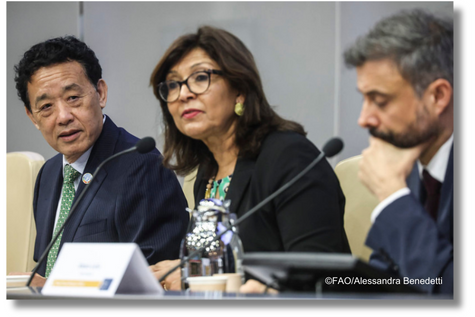
Opening the meeting, FAO Director General QU Dongyu highlighted the aim "to look, take stock and review what progress we have made, the real challenges for us ahead". Li Junhua, UN Undersecretary General for Economic and Social Affairs (UNDESA), urged the gathering to generate bold ideas to combat hunger levels not seen since 2005. Paula Narvaez, President of the Economic and Social Council (ECOSOC), conveyed, in a letter to participants, that while achieving Zero Hunger is feasible, it requires innovative, customized solutions to overcome obstacles. Alvaro Lario, President of the International Fund for Agricultural Development (IFAD), stressed the imperative for collective action to increase investment in smallholder farmers and support rural communities at the grassroots level.
The EGM brought together representatives from non-governmental organizations, civil society, the private sector, academia, scientists, and researchers, as well as the UN system, to assess progress on SDG 2, analyze trends and challenges, and explore innovative solutions to catalyze action at scale.
Discussions revolved around several themes:
Review of progress and lessons learned: Experts examined each of the SDG 2 targets, scrutinizing advancements since 2015 from global, regional, and local perspectives, with the assistance of moderators from the UN agencies who are custodians or significantly work towards each of these targets.
- Target 2.1 – End Hunger: In a session moderated by David Laborde, Director of the Agrifood Economics Division at FAO, speakers, including Michael Windfuhr, Committee on Economic, Social and Cultural Rights (CESCR) and the German Institute for Human Rights, Abdi Fidar, IGAD Food Security, Nutrition and Resilience Analysis Hub, and Sheryl L Hendriks, Natural Resources Institute at the University of Greenwich, advocated for a rights-based, holistic approach to agrifood system transformation.
- Target 2.2 - End all Forms of Malnutrition: A session moderated by Mauro Brero, Senior Nutrition Adviser - Food Systems for Children, UNICEF, featured interventions from Lara Nasreddine, Professor of Nutrition at the American University of Beirut, who emphasized strategic alignment in policies and the value of improved data; Amos Laar, Professor of Public Health Nutrition at the School of Public Health, University of Ghana, who highlighted successful strategies from Senegal and Ghana of community-focused health and nutrition programmes; and Simon Barquera, National Institute of Public Health in Mexico, who highlighted the double burden of obesity and malnutrition.
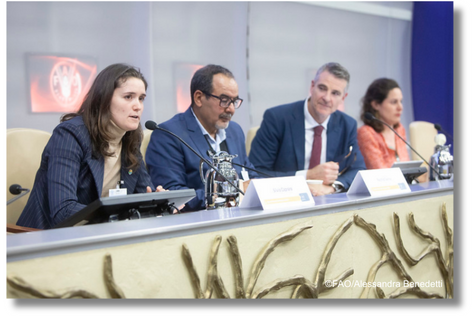
- Target 2.3 - Double Agricultural Productivity and Incomes of Small-Scale Food Producer: This session moderated by Ron Hartman, Director for Global Engagement, Partnerships and Resource Mobilization at IFAD, included interventions from Rachid Serraj, Professor and Member of the High-Level Panel of Expert in Food Security and Nutrition (HLPE) of the Committee on Food Security (CFS) at the United Nations; Magdalena Ackermann, Co-coordinator ad interim of Civil Society and Indigenous Peoples' Mechanism (CSIPM) Secretariat; and Silvia Caprara, Representative of the World Farmers Organization (WFO), who stressed the pivotal role of small-scale farming and local food production in enhancing food availability and included calls for an agroecological transition, enhanced funding for family farming and financial support for loss and damage due to climate change impacts.
- Target 2.4 - Ensure Sustainable Food Production Systems: A session, moderated by Corinna Hawkes, Director Food Systems and Food Safety Division at FAO, included interventions from Elizabeth Nsimadala, Eastern Africa Farmers Federation (EAFF) who underlined the importance of creating a safety net for smallholder farmers and increasing their access to finance; Michael Keller, International Seed Federation, who highlighted the importance of linking private sector innovations directly with farmers to enhance food production efficiency and sustainability; Becca Jablonski, Food Systems Institute at Colorado State University, proposed the development of regional governance structures to facilitate more equitable dialogue and decision-making between farmers and urban stakeholders, for tailored approaches to sustainable agriculture; and Juliette Tronchon, ProVeg International, who promoted a farm-to-fork approach that integrates stakeholders into decision-making processes and a shift toward plant-rich diets.
- Target 2.5 - Maintain Genetic Diversity In this session, moderated by Kent Nnadozie, Secretary for the International Treaty on Plant Genetic Resources for Food and Agriculture at FAO, speakers, including Patricia Goulart Bustamante, Embrapa; Justine Lynn Limocon, Asian Farmers Association for Sustainable Rural Development (AFA); Sophie Aylmer, NGO Major Group, highlighted successful national initiatives, advocated for revitalizing traditional seeds and recognizing indigenous knowledge and stressed the benefits of local livestock breeds for adaptability to climate change.
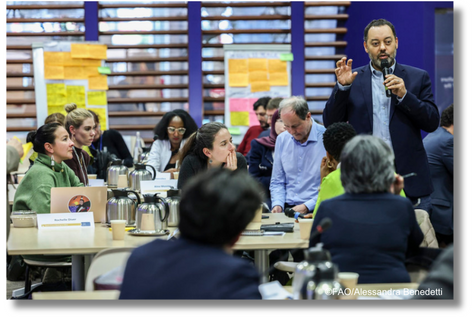
- Target 2.a; 2.b; 2.c – Investment, Trade, Market: This session, moderated by Boubaker Ben Belhassen, Director of the Markets and Trade Division at FAO, highlighted the role of markets and trade as pivotal mechanisms for achieving SDG 2. Proposals from speakers including Shenggen Fan, China Agricultural University; Akiko Suwa-Eisenmann from INRAE/HLPE-FSN; Abdul Husaini from the Niger State Ministry of Lands and Survey; and Fadhel Kaboub from the Global Institute for Sustainable Prosperity advocated for an over a systemic transformation of the global financial and trade architecture, with a focus on improved governance and empowering smallholder farmers, and a reform of agriculture subsidies to redirect funds towards producing nutritious food and supporting smallholder farmers.
Challenges and drivers: Under the moderation of Rebecca Richards, Head of the Global Network Against Food Crises at WFP, a dedicated session on tackling underlying causes and drivers of stagnated or reversed progress towards SDG 2 included interventions from Justine Lynn Limocon from the Asian Farmers Association for Sustainable Rural Development (AFA); Inaya Ezzeddine, Member of the Lebanese Parliament; Jean-François Soussana, Member of the Scientific Advisory Board of the UN Food System Coordination Hub; and Paul Howe, Director, Feinstein International Center, Tufts University, who identified the intensifying climate crisis, conflict, recovery from the COVID-19 pandemic, economic slowdowns, and structural inequalities within and between countries as significant challenges impeding progress towards SDG 2.
Interlinkages between SDG 2 and the other SDGs: Promising solutions to address hunger and food insecurity were explored, with a focus on utilizing the synergies (and managing the trade-offs) with other SDGs through the lens of:
- People: Moderated by Lauren Phillips, Deputy Director of FAO's Rural Transformation and Gender Equality Division, this session explored the interconnection between SDG 2 and SDGs 1, 3, 4, 5, and 10. With interventions from Charlotte Dreger, Policy and Advocacy Officer for Sustainable Food Systems, FIAN International Secretariat; Akiko Suwa-Eisenmann; Rochelle Diver, Indigenous Peoples Major Group; and Simon Barquera, it discussed strategies for social equity and included proposals for social protection programmes, fair-trade agreements, support for traditional practices as ecosystem solutions and health based education programmes.
- Planet: Moderated by Kaveh Zahedi, FAO's Director of Climate Change, Biodiversity, and Environment, this session focused on the interconnections between SDG 2 and SDGs 6, 13, 14 and 15. Speakers included Jean-François Soussana, who highlighted nature-based solutions to food insecurity, such as reforestation and biodiversity preservation, along with food-driven responses like disaster risk reduction; Elisabeth Mwende Mwendwa, Agricultural Technology Development Center, Kenya, emphasized the challenges of conventional agriculture's heavy water use and pollution; Magdalena Ackermann advocated for an agroecology approach to address social injustice, climate change, and biodiversity loss; Jean-Luc Chotte, Research Director, IRD, stressed the urgency of addressing land degradation to reduce threats to biodiversity; and Cecilia Elizondo, ECOSUR Agroecology Group and HLPE-CFS, discussed Mexico's successful implementation of laws promoting healthy and sustainable food practices to reduce emissions and chemical use in agriculture.
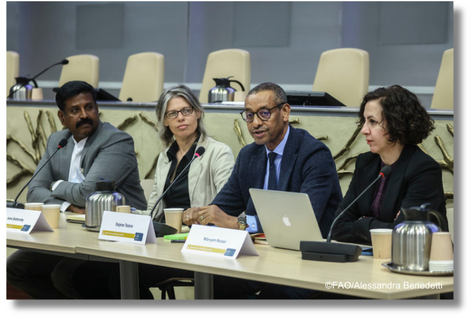
- Prosperity: Moderated by Dejene Tezera, Director of Agri-Business at UNIDO, this session addressed the interconnections between SDG 2 and SDGs 7, 8, 9, 10, 11 and 12. Maryam Rezaei, Research Fellow - Food Systems, Climate and Sustainability, ODI Global, highlighted the need to tackle food loss and waste to address food security; Brian Kawuma, Powering Agriculture Director, Power For All, emphasized the opportunities for agrifood systems to contribute to the clean energy transition. Jane Battersby, Associate Professor in the Department of Environmental and Geographical Science at the University of Cape Town, stressed understanding and adjusting policy with respect to the urban-rural link through a farm-to-fork approach. Rajgopal Dashrath Chandra Shekar, Indian National Trade Union Congress, emphasized the role of trade unions in securing better working conditions in agriculture and food sectors to address hunger and poverty.
- Peace: Moderated by Jesse Wood, Chief of Humanitarian Policy and Practice at WFP's Emergency Preparedness and Response Service, this session featured insights from Habib Ur Rehman Mayar, Deputy General Secretary of the g7+ Secretariat; Inaya Ezzedine; Abdi Fidar; and Michael Windfuhr on the interconnections between SDG 2 and SDG 16. It underscored the critical connection between conflict and hunger, with conflict a primary driver of food insecurity. Recommendations included transitioning towards long-term humanitarian endeavours aimed at building resilience and strong government institutes and fostering effective collaboration among UN agencies to prevent fragmentation of efforts.
Means of implementation: Pathways to progress were explored under three themes:
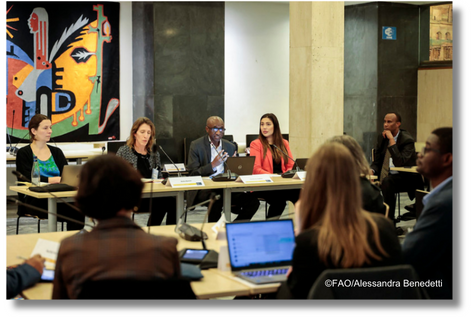
- Investment and Financ: Moderated by Jyotsna Puri, Associate Vice-President, Strategy and Knowledge Department, IFAD, this session included Patrick Caron, CGIAR Vice-chair; Arthur Muliro, Deputy Managing Director, Society for International Development; and Brian Baldwin, International Agrifood Network as speakers. It highlighted the need to ensure investments are strategically placed across the value chain and reach smallholder and family farmers, addressing the multiple gaps in nutrition, resilience, and adaptation. It also stressed the role of blended finance platforms and putting in place the right incentives to bring various actors together.
- Science and technology: Moderated by Astra Bonini, Chief of the Integrated Policy Analysis Branch, UNDESA, this session emphasized the need for context-specific solutions in science, technology, and innovation. Speakers, including Ibrahima Hathie, Deputy Director, Feed the Future Policy Systems Services, Senegal; Chiara Villani, Senior officer, Global Engagement and Executive Communications at the Alliance of Bioversity International and CIAT; and Aline Mosnier, Scientific Director, FABLE Pathways Consortium, highlighted the importance of participatory approaches, the co-creation of innovations, and gender and age disaggregation to effectively address diverse needs and ensure shared values and ownership while ensuring transparency and traceability.
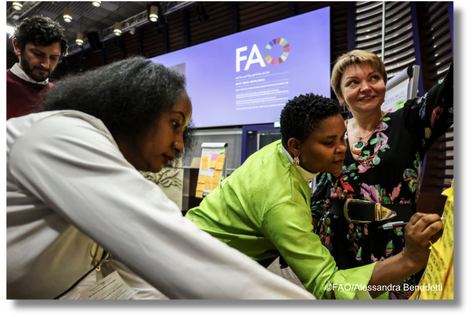
- Partnerships and Collaboration: Moderated by Fatouma Seid, Deputy Director at FAO's Division on Partnerships and UN Collaboration, this session stressed inclusive engagement and structured multi-stakeholder partnerships. Speakers included Facundo Etchebehere, Senior Vice President of Sustainability Strategy & Partnerships at Danone; Belinda Ng, Major Group for Children and Youth; Francine Picard, Director for Partnerships at the Shamba Centre for Food and Climate; and Andrea Galante, Senior Policy Advisor for Food Security and Nutrition, Advocacy and External Engagement at World Vision International. They emphasized the need for inclusive platforms to enable participatory approaches involving family farmers, women, youth, and marginalized groups and structured partnerships, involving diverse expertise and sustainable financial backing, to accelerate SDG 2 progress.
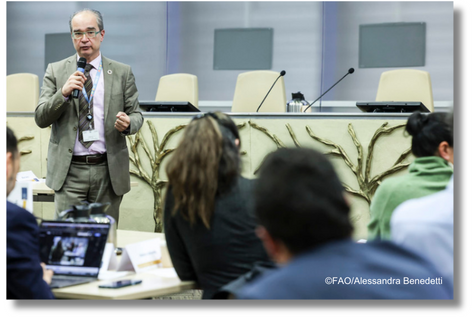
The overarching insights and recommendations generated during the EGM were collected in a concluding session, moderated by Stefanos Fotiou, Director of the FAO Office of Sustainable Development Goals. These insights will be distilled into a comprehensive report highlighting key findings, emerging trends, and actionable strategies identified by experts. The report will contribute to shaping the discourse surrounding SDG 2 at the 2024 HLPF, providing policymakers, stakeholders, and the wider international community with valuable insights into the challenges and opportunities associated with achieving food security and eradicating hunger. FAO Chief Economist, Máximo Torero, provided the closing remarks, highlighting the urgency to accelerate on all SDG2 indicators
Find more information, including biographies of participating experts and moderators, background resources provided by the experts and UN agencies involved and statements made throughout the two-day event, on the EGM on SDG 2 website.
